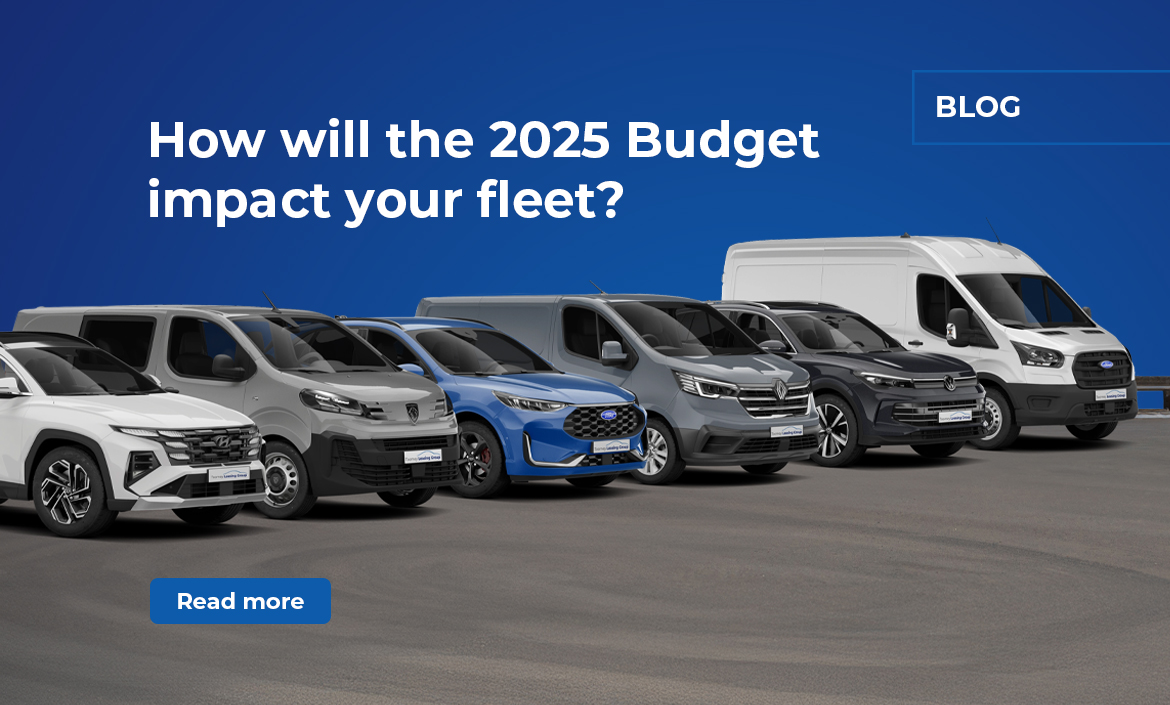What the Autumn Budget 2025 Means for Leasing and Fleet Management
The UK Budget 2025 brings changes that will affect leasing, fleet management, and how businesses operate their vehicle fleets. New taxes on electric vehicles and changes to fuel duty are coming. There are also updates to company car taxes. Fleet managers and leasing customers need to review their plans. These changes affect fleets of all sizes, from small teams with just two vehicles to large operations with hundreds of cars and vans.
A major announcement is the mileage-based tax for electric vehicles (EVs) and plug-in hybrids (PHEVs). Starting in April 2028, EVs will pay 3 pence per mile, and PHEVs 1.5 pence per mile. This electric Vehicle Excise Duty (eVED) replaces lost fuel duty revenue as more vehicles switch to zero emissions.
For a fleet vehicle driving 8,000–8,500 miles a year, the charge will be around £240–£255 annually. Although it is still lower than the fuel duty for petrol or diesel vehicles, it is a new cost. This cost must be included in fleet management and total ownership calculations.
The Budget also freezes fuel duty until September 2026. This provides short-term relief for fleets running petrol or diesel vehicles.
It stabilises fuel consumption costs but is only temporary. Businesses should plan for increases after 2026, as fuel duty may rise again. For high-mileage or commercial fleets, this could have a significant effect on operating budgets and planning.
To encourage cleaner transport, the government raised the threshold for the Expensive Car Supplement on EVs from £40,000 to £50,000. This makes mid-range EVs more affordable for company fleets. The 100% First-Year Allowance for zero-emission vehicles and EV charging stations has been extended for one more year. These incentives make it easier for businesses to buy vehicles and manage their fleets. This is helpful for those wanting to update or grow their fleets.
Company car taxation has also changed. PHEVs will be taxed at a nominal 1g/km CO₂ until April 2028, reducing costs for employers and drivers. Employer National Insurance Contributions (NICs) are increasing, which raises the cost of providing vehicles, especially through salary sacrifice schemes. Combined with eVED and EV threshold adjustments, businesses now face a more complex financial landscape for fleet management.
The impact of these changes depends on fleet size. Smaller fleets, with two to twenty vehicles, may find the economics of EV adoption less clear. EVs remain cost-effective for low-mileage vehicles, but the new mileage tax requires careful consideration of annual mileage and operating costs.
Here, leasing offers flexibility. Short-term or adaptable lease contracts reduce risk while providing access to a wide range of vehicles. Leasing, along with fleet management software, helps track mileage, fuel use, maintenance, and driver activity. This allows businesses to make better decisions.
Medium and large fleets require a more strategic approach. High-mileage electric vehicles (EVs) will be most impacted by the eVED.
Mixed fleets may offer the best balance of cost and efficiency. Each vehicle’s duty cycle, fuel management, and operational needs should guide procurement decisions. Using fleet management systems helps track vehicles, manage drivers, and handle maintenance. This improves visibility and helps fleet managers see how the budget affects fleet operations.
Specialist fleets, including commercial vans, pickups, service vehicles, and mixed-use fleets, face specific challenges. EVs may be ideal for urban or low-mileage tasks, but long-range or high-load operations may still require hybrids or ICE vehicles. In these cases, fleet management solutions are critical for maintenance scheduling, monitoring fuel consumption, and ensuring operational reliability. Residual values, environmental impact, and long-term tax costs should guide vehicle choice and fleet composition.
The 2025 Budget also highlights why leasing is more important than ever. Leasing allows businesses to stay flexible, reduce long-term risk, and respond to regulatory changes.
Leasing providers can handle maintenance, fleet management software, fuel tracking, and driver management. This allows internal teams to focus on their main tasks. Leasing offers many types of vehicles. This helps businesses choose the right vehicle for their needs. It improves cost efficiency and flexibility.
Accurately calculating total cost of ownership is now essential. This includes eVED charges, fuel duty, maintenance, residual values, and operational factors like annual mileage and driver behaviour. Modern fleet management software collects and analyses this data, enabling managers to optimise fleet operations, reduce costs, and ensure vehicles remain fit for purpose.
For small fleets and SMEs, flexibility and adaptability are key. Short-term leases supported by fleet management systems allow businesses to respond as tax rules and operating conditions evolve. Accurate monitoring of mileage, fuel, maintenance, and driver activity ensures vehicles remain cost-effective. This approach reduces financial risk and keeps operating costs predictable.
Large fleets require more detailed planning. Vehicles should match usage patterns, with urban, low-mileage vehicles suited to EVs, and long-distance or heavy-use vehicles running hybrids or ICE models. Segmenting the fleet by duty cycle and using fleet management software to track performance allows data-driven decisions. This strategy improves efficiency, reduces unnecessary expenditure, and keeps fleets compliant with tax rules and environmental standards.
Investing in professional fleet management solutions is more important than ever. Systems provide real-time insights into vehicle utilisation, fuel management, maintenance needs, and driver management. They support reporting for tax compliance and help businesses adapt to future regulatory changes. Combined with leasing, these tools give businesses the flexibility and control they need to operate efficiently.
The Budget also affects environmental impact and sustainability planning. While EV incentives remain, the eVED introduces a new cost consideration. Businesses must weigh environmental goals against financial implications, particularly for high-mileage operations. A mixed fleet strategy, combining EVs, hybrids, and efficient ICE vehicles based on operational needs, balances cost, efficiency, and environmental responsibility.
The 2025 Budget reshapes fleet management across the UK. Businesses must now review vehicle acquisition, leasing, fleet management software, fuel management, maintenance scheduling, and operational strategy. By adopting a flexible, data-driven approach, companies can control costs, improve operational efficiency, and maintain compliance while meeting environmental targets.
Fleet managers should also consider future-proofing their fleet operations. With potential tax rises, increasing fuel costs, and stricter environmental regulations on the horizon, proactive planning is key. Accurate vehicle tracking, monitoring annual mileage, and scheduling maintenance ensure that fleets operate efficiently. Businesses that combine these tools with leasing can quickly adapt fleet composition, optimise costs, and maintain a high level of service.
Businesses should also focus on driver management. Training drivers on efficient driving, route planning, and safe vehicle use can help save fuel. It can also reduce wear and tear on vehicles and improve safety.
When combined with fleet management systems, businesses can track driver behaviour, set targets, and reward efficiency. This not only improves operations but also reduces the overall environmental impact of the fleet.
Another important consideration is maintenance scheduling. Regular maintenance keeps vehicles running efficiently, reduces downtime, and extends vehicle life.
Integrating maintenance planning into a fleet management system allows managers to schedule checks, track servicing costs, and plan replacements. This proactive approach keeps fleets reliable. It lowers unexpected costs and supports fleet management solutions that are affordable and sustainable.
Finally, businesses should review their vehicle acquisition strategy. Choosing the right mix of EVs, hybrids, and ICE vehicles depends on duty cycles, mileage, and operational needs. Leasing offers flexibility to change the fleet as rules and taxes change. Access to many vehicles helps businesses choose the right one for each job. Careful planning now will help fleets remain efficient, compliant, and financially sustainable for years to come.
In conclusion, the 2025 UK Budget introduces major changes for fleet managers and leasing customers. The eVED, revised EV thresholds, fuel duty freeze, and company car tax adjustments require careful planning.
Fleets of all sizes must take a strategic approach to fleet management, vehicle acquisition, and operational efficiency. Using leasing with professional fleet management solutions allows businesses to remain flexible, cost-efficient, and compliant. Companies that track fuel use, manage vehicle fleets, oversee drivers, and plan maintenance will be ready for changes. They will build strong and sustainable fleets for the future.


